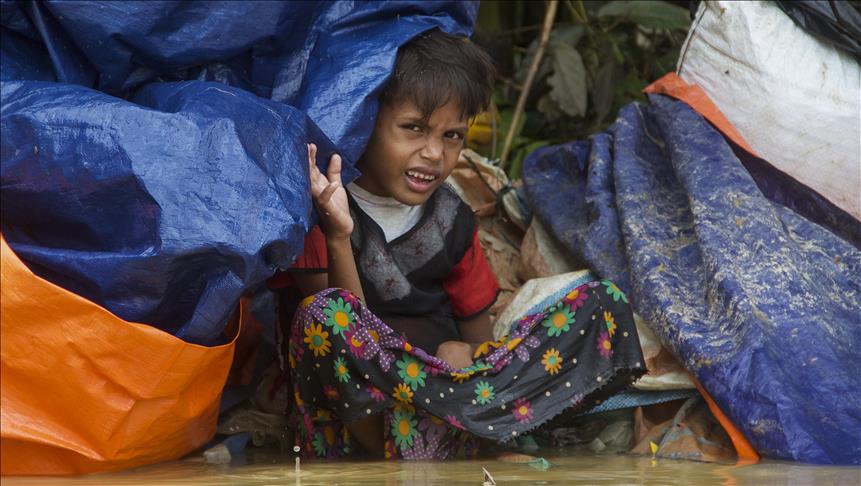India seals maritime boundary to stop Rohingya Muslims
Rohingya Muslims in India hope Supreme Court would decide in their favor
 COX'S BAZAR, BANGLADESH - SEPTEMBER 20: A Rohingya Muslim kid, fled from ongoing military operations in Myanmar’s Rakhine state, looks on at a refugee camp in Cox's Bazar, Bangladesh on September 20, 2017. Rohingya Muslims appreciate the humanitarian aids from Turkish Red Crescent, Disaster and Emergency Management Presidency of Turkey (AFAD), Humanitarian Relief Foundation (IHH) and other Turkish foundations. Violence erupted in Myanmar’s Rakhine state on Aug. 25 when the country’s security forces launched an operation against the Rohingya Muslim community. It triggered a fresh influx of refugees towards neighboring Bangladesh, though the country sealed off its border to refugees. ( Safvan Allahverdi - Anadolu Agency )
COX'S BAZAR, BANGLADESH - SEPTEMBER 20: A Rohingya Muslim kid, fled from ongoing military operations in Myanmar’s Rakhine state, looks on at a refugee camp in Cox's Bazar, Bangladesh on September 20, 2017. Rohingya Muslims appreciate the humanitarian aids from Turkish Red Crescent, Disaster and Emergency Management Presidency of Turkey (AFAD), Humanitarian Relief Foundation (IHH) and other Turkish foundations. Violence erupted in Myanmar’s Rakhine state on Aug. 25 when the country’s security forces launched an operation against the Rohingya Muslim community. It triggered a fresh influx of refugees towards neighboring Bangladesh, though the country sealed off its border to refugees. ( Safvan Allahverdi - Anadolu Agency )
By Shuriah Niazi
NEW DELHI, India
The government has sealed the maritime boundary after receiving intelligence that Rohingya Muslims would try to enter India using sea routes, according to Indian media reports Wednesday.
“Maritime surveillance aircraft, including Dornier, hovercraft and patrolling ships of the border guarding forces have been activated in the entire region to prevent the influx of Rohingya, who are seen as a major threat to national security by the centre," a senior government official was quoted as saying by India Today.
The move comes after the government on Monday informed the Supreme Court in its affidavit that it believed the Rohingya Muslims posed a grave security threat to India, alleging that many of the refugees escaping persecution by Myanmar’s military supposedly had links with terrorist organizations such as Daesh and Pakistan army's Inter-Services Intelligence, also known as the ISI.
In the affidavit, the government led by rightwing Bharatiya Janata Party also said it fears violence against Buddhists living in India by Rohingya fleeing violence in Myanmar.
"Many of the Rohingya figure in the suspected sinister designs of ISI/ISIS and other extremists groups who want to achieve their ulterior motives in India, including that of flaring up communal and sectarian violence in sensitive areas of the country," the government claimed in its affidavit.
However, Prashant Bhushan, a senior lawyer representing Rohingya Muslims, told Anadolu Agency the Indian government’s claims were not based on evidence.
“The government has not found any proof against these people. Not a single First Information Report [police reports] has been filed in police stations against these people,” Bhushan said.
The government said it would place all intelligence inputs in a sealed envelope before the apex court on Oct. 3 to prove its claim that Rohingyas are a security threat.
The affidavit was filed at the Supreme Court in response to petition filed by two Rohingya refugees living in India.
In their petition, Mohammad Shaqir and Mohammad Salimullah argued their deportation would violate India’s constitution.
Rohingya Muslims are neither accepted as citizens by Myanmar nor its neighbor Bangladesh and live in constant fear following the Indian government’s plan to deport 40,000 Rohingya Muslim refugees.
- Rohingya deny terror claim
In India, they are mostly settled in the states of Andhra Pradesh, Manipur, Rajasthan, Uttar Pradesh, Delhi, Maharashtra, Rajasthan and Haryana.
Uneasy calm prevails in localities such as Shaheen Bagh and Mandapur Khadar in New Delhi, where some 1,000 Rohingya Muslims live at camps.
“We just want to live here since we have suffered a lot in Myanmar. We don’t have anything here except peace,” Faizullah, who fled Myanmar in 2012, said.
Rohingya Muslims in India hope the Supreme Court would decide in their favor.
“India has helped us a lot. We hope that we will not be deported from here. We are a peace loving people and not involved in any activities with terrorist groups,” Abdul Rahim, who runs a small shop in the locality, said.
Last month, State Minister Kiren Rijiju told parliament the central government had asked Indian states to identify Rohingya Muslims living illegally and initiate deportation processes.
Since Aug. 25, more than 421,000 Rohingya have crossed from Myanmar's western state of Rakhine into Bangladesh, according to the UN.
The refugees are fleeing a fresh security operation in which security forces and Buddhist mobs have killed men, women and children, looted homes and torched Rohingya villages. According to Bangladeshi Foreign Minister Abul Hasan Mahmood Ali, around 3,000 Rohingya have been killed in the crackdown.
Turkey has been at the forefront of providing aid to Rohingya refugees and President Recep Tayyip Erdogan raised the issue during his address at the UN General Assembly on Tuesday.
The Rohingya, described by the UN as the world's most persecuted people, have faced heightened fears of attack since dozens were killed in communal violence in 2012.
Last October, following attacks on border posts in Rakhine's Maungdaw district, security forces launched a five-month crackdown in which, according to Rohingya groups, around 400 people were killed. The UN documented mass gang rapes, killings -- including of infants and young children -- brutal beatings, and disappearances committed by security personnel. In a report, UN investigators said such violations may have constituted crimes against humanity.
Anadolu Agency website contains only a portion of the news stories offered to subscribers in the AA News Broadcasting System (HAS), and in summarized form. Please contact us for subscription options.







